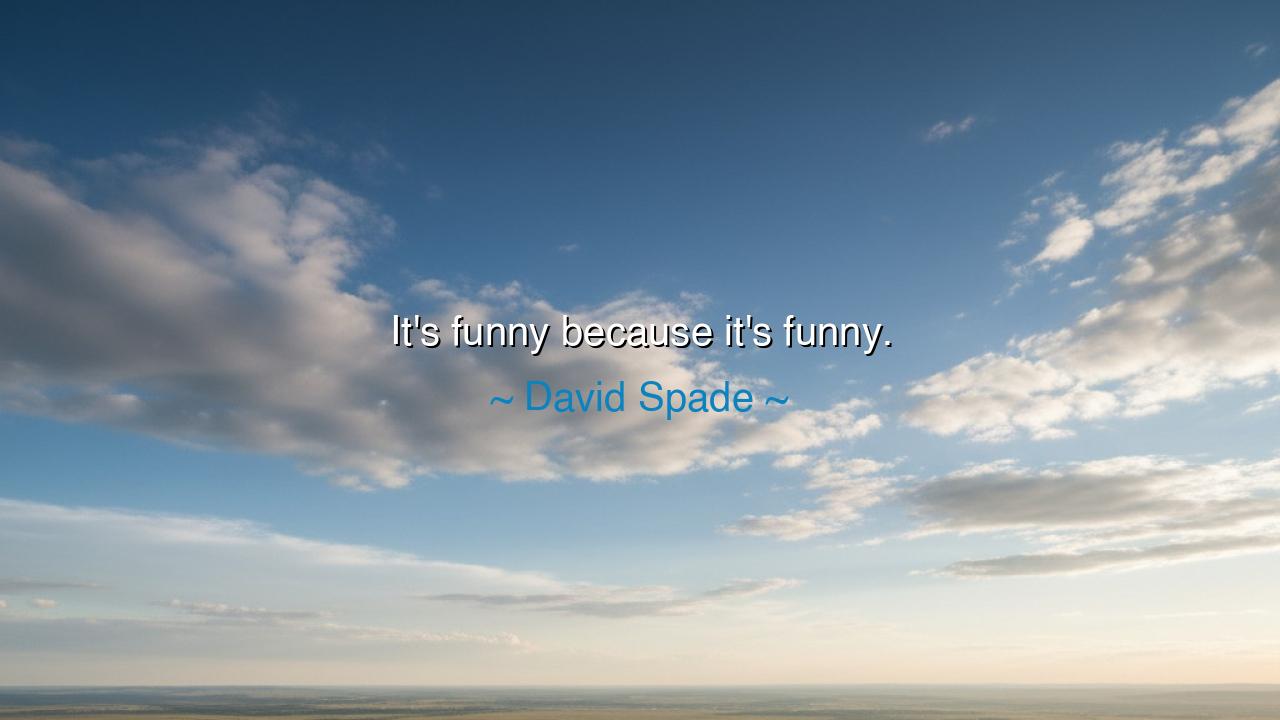
It's funny because it's funny.






“It’s funny because it’s funny.” — thus spoke David Spade, the sharp-tongued humorist whose simplicity often conceals profound insight. In these few words, he captures the essence of authenticity, truth, and the mysterious nature of humor itself. Though the saying may seem circular — a jest about jesting — it reveals a wisdom as old as laughter: that some things in life do not need justification, dissection, or defense. They simply are. The statement is both defiant and pure, an anthem for those who understand that joy and comedy spring not from reason, but from the heart’s recognition of truth.
The origin of this quote lies in Spade’s world — the realm of stand-up comedy, where truth and timing collide in a battle for connection. In that arena, every joke faces judgment. Some people demand to know why something is funny, to analyze humor as if it were a formula. But Spade’s declaration refuses such overthinking. “It’s funny because it’s funny” means that the essence of comedy — and indeed, of all emotion — cannot be reduced to logic. Like beauty or love, laughter transcends explanation. It exists in a sacred, fleeting space between speaker and listener, a spark of recognition that says: Yes, I see what you see.
In a deeper sense, this quote speaks to the purity of art itself. The artist, the comedian, the poet — all create not to satisfy reason, but to awaken feeling. The ancient playwright Aristophanes, who filled the theaters of Athens with laughter, once faced philosophers who demanded to know the meaning of his humor. His answer was not far from Spade’s: he wrote because he loved to make people laugh — nothing more, nothing less. The laughter was the message. In the same way, Spade reminds us that humor, at its best, is truth undressed — a mirror of human absurdity that needs no ornament. When something is truly funny, it bypasses the intellect and speaks directly to the soul.
To understand the depth of this idea, consider the story of Charlie Chaplin, the silent genius of cinema. In one of his most famous scenes, he plays a tramp eating his shoe, delicately twirling the laces like spaghetti. The audience laughed until they cried — not because the scene was rationally funny, but because it captured the beautiful contradiction of human endurance and foolishness. There was no need to explain it. It was funny because it was funny — and within that laughter lay both sorrow and triumph. Chaplin’s art, like Spade’s wisdom, reminds us that meaning does not always need words; sometimes, it simply needs to be felt.
In this way, the quote also becomes a defense of simplicity in a world that craves complexity. Too often, people demand to know why something moves them. They fear mystery; they dissect spontaneity. Yet in doing so, they lose the magic. The ancients knew this well: when one of Aristotle’s students asked him why humans enjoy comedy, the philosopher replied, “Because we are mortal, and laughter is our defiance.” That is the truth Spade’s quip carries — that the joy of laughter needs no further reason than itself. It is a flame that burns for its own sake.
But there is also an undercurrent of rebellion in Spade’s words. “It’s funny because it’s funny” is a declaration of independence — the comedian’s refusal to bow to analysis, to defend his craft to those who do not understand it. It is the voice of every artist who has stood before a crowd of skeptics and said, I owe you nothing but my truth. In that way, Spade joins the lineage of tricksters, jesters, and sages who used humor not to please, but to reveal. His words remind us that laughter itself is a form of freedom — the courage to embrace joy without apology.
The lesson, then, is clear and timeless: not everything in life needs to be explained. Some things — laughter, wonder, love — exist beyond reason’s reach. To demand an answer for every joy is to kill the joy itself. So let yourself laugh without guilt, smile without explanation, and find humor in the small absurdities of life. When something moves you — when it feels right — do not rush to analyze it. Accept it as truth. Accept it as life speaking through you.
Thus spoke David Spade, in jest but also in wisdom. For in saying, “It’s funny because it’s funny,” he gives us a philosophy of joy — one that transcends the stage and speaks to the soul of living. Life, after all, is not a problem to be solved, but a mystery to be embraced. And perhaps the wisest thing we can do — in laughter, in love, and in every fleeting moment of wonder — is to stop explaining, and simply let it be funny because it’s funny.






AAdministratorAdministrator
Welcome, honored guests. Please leave a comment, we will respond soon